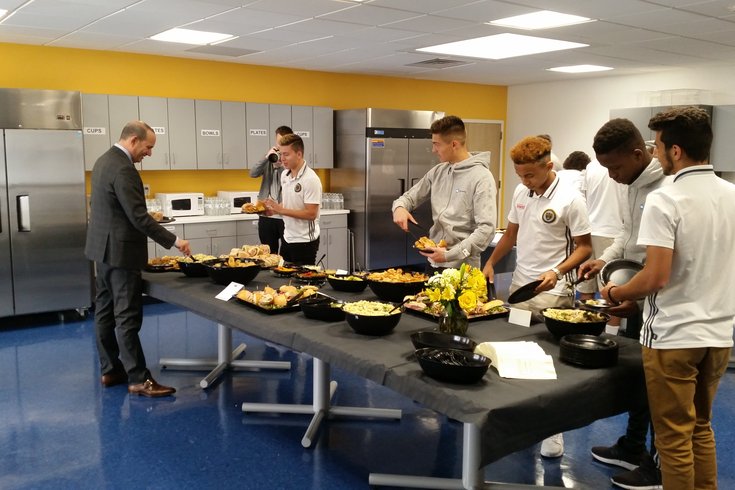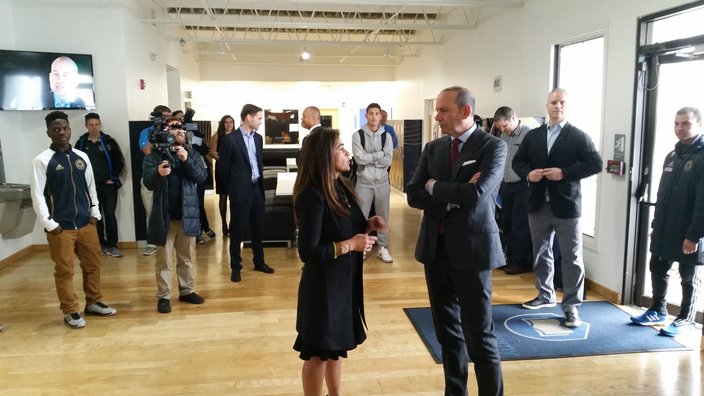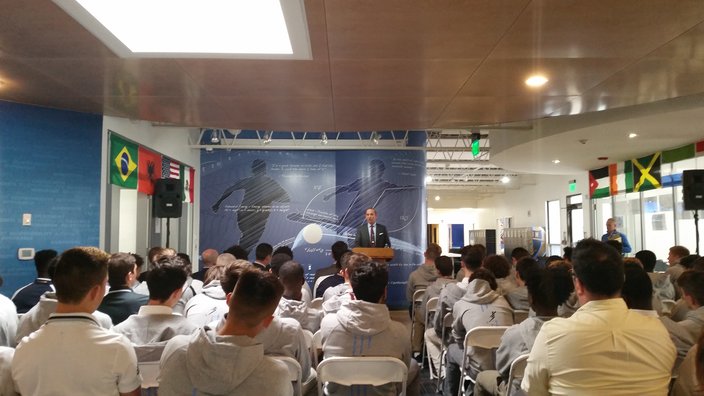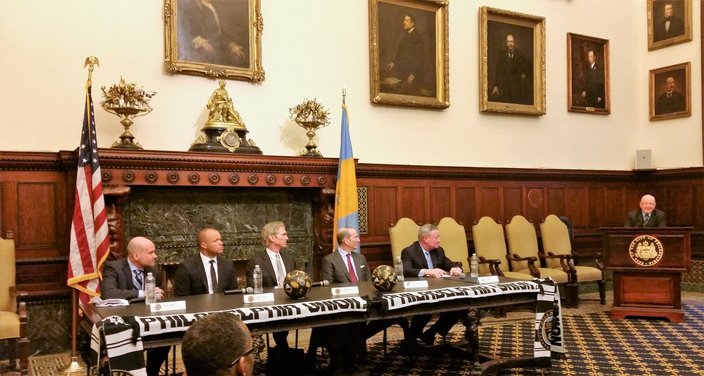
March 08, 2017
 Kevin Kinkead/for PhillyVoice
Kevin Kinkead/for PhillyVoice
MLS commissioner Don Garber visited the Union academy for the first time during a day-long trip to Philadelphia.
It wasn't long ago that suburban Philadelphia kids were playing winter soccer at a two-field indoor complex in Wayne called "Rocket Sports." The turf was worn, the boards were cold and hard, and there was barely enough room for two bleachers, a bathroom, and a front desk.
In 2017, the facility now known as YSC Sports hosts four fields (two outdoors), locker rooms and weight rooms, an observatory, and the entire Philadelphia Union academy system. A fully-equipped school was built for those kids in an unassuming office park across the street. You can even hop in your car and drive 30 seconds down the street to find a brand new Wegman's and Brazilian steakhouse inside of a residential and retail center juxtaposed with the King of Prussia Mall.
The old "rocket" would never have attracted anyone of significance, so a visit from MLS commissioner Don Garber on Tuesday shows just far things have come for this facility.
Garber started his day in Chester and met with Union front office members. He came to YSC at noon and was taken through the complex by Academy Director Tommy Wilson and Sporting Director Earnie Stewart.
The commissioner then walked over to the educational building, where he had a brief chat with the Head of School, Dr. Nooha Ahmed-Lee. He sat down for lunch with a few of the academy students, then addressed the entire group and took a few questions from the crowd.
He also spent a few minutes with local media:
PhillyVoice: What do you make of all of this?
Garber: "It’s fantastic. We are trying to build this game from the bottom up. Everyone should know that the Union really are punching way above their weight and have been doing so for many, many years on the development side. I’ve heard about this facility. I’ve spent a lot of time with (YSC owner and Union investor Richie Graham) and it’s great to finally be here, actually see kids that are wearing the Union uniform and being trained at a high level and being part of a system that we hope will create the next generation of great American players."
Delco Times: How important is the integration of the educational side? A lot of programs do a lot developmentally, but having the kids be here for school and soccer all in one, how important is that?
Garber: "I think it’s the evolution of the system in Major League system. Vancouver is doing something similar, Toronto just announced that they’re doing it, and Salt Lake is looking at it. But Richie, YSC, and the Union are very, very focused on having a fully integrated program, and the fact that you can have kids here, not just learning how to play but becoming educated and learning about many things that are more important in life, I think rounds out the program and makes it more valuable to our league, makes it more valuable to the Union and their family, and frankly it tells an important story about what we’re really here to do. It’s not just about the game; it’s about developing great men who can represent our country on and off the field. That’s as important to me as having a player that’s going to be scoring a lot of goals and signing his first professional contract."
MLS commissioner Don Garber meets with the Union Academy's Head of School, Dr. Nooha Ahmed-Lee.
Garber: "The bar continues to get raised, but the bar had to get set at the beginning. The Union have done a very good job of building the right facilities and having the right infrastructure and the right people around it for many years. I want to see a program like this in every market. I was in Salt Lake on Saturday; I saw their facility. I saw the plans for the Portland facility. Orlando is in the process of getting their facility up and running. Atlanta has a groundbreaking on April 11th. Our teams are trying to build this soccer nation that we have dreamed about with bricks and mortar, and the top of that building are our first teams. But you’ve got to get it right below the first teams. The USL association with Bethlehem Steel and Philadelphia is a very successful partnership, and I think Philadelphia is doing a good job, is doing it right."
Michael Bradley: Would you encourage the other franchises to come here, look at this, and use this as a model?
Garber: "I think every team has got to pick their own formula, and this one seems to be working very well in Philadelphia. But you have to remember that this existed before the Union did and the Union took it to another level. And I do believe the future of these facilities and development programs are going to have them fully integrated, where there’s a Union logo on this building that’s alongside the YSC, and it is a palace for kids to both train but also a place where kids will aspire to be a part of. That U-14, U-16, U-18 locker room is moving down the line so that eventually they can be playing in the first team locker room. A more direct answer is that this is working very well for Philly, but every club has got to find the formula that makes sense for them. The one thing I think is crucially important, and the Union have been very committed to this, is to have the residential and educational component be a part of it, and I think we’re going to see more and more of that going forward."
ML commissioner Don Garber ate lunch with academy students, then addressed the entire group.
Part two of Garber's visit was a fluffy City Hall appearance, billed as some sort of "kick off" for the 2017 Union season.
Color commentator Tommy Smyth moderated a panel that included Garber, Stewart, Mayor Jim Kenney, Union owner Jay Sugarman, and Chief Business Officer Tim McDermott.
Each panelist was introduced to a crowd of guests, media, suits, and front office types before they were lobbed a few softball questions about the state of the team and the upcoming season.
Mayor Kenney left the event early, presumably to deal with more important matters. He also referred to the commissioner as "Dan Garber." Nothing of substance was asked by a pre-selected group of season ticket holders and Union fans.
We did get to speak with the panelists after the event, and got a few more interesting pieces of information.
I asked Sugarman about the completion of the Chester practice fields and training center, and whether that would free up money for other projects going forward:
"It certainly helps to get through," Sugarman said. "We still have more capital improvements that we have to make, so, unfortunately, it's not over yet. Between the academy and Bethlehem and some of the improvements.. we literally want to control a mile of (Chester) riverfront so that we can start planning a full campus experience. We're well on our way but it's not over yet. I think Tim's job - and I've told him flat out - he needs to start capitalizing on all of the foundational work that's been done. Earnie's job? We need a winner. We need people excited. We need sponsors to step up. We need the community to step up. We need our fans to step up. It will all be a virtuous circle if it all starts working, but we knew we wouldn't get there unless we started to put the foundational elements in place. I would say we're about 80% done with one or two more big things coming. Then, yes, I think the dynamic will be where we'll able to say, 'now there's nothing else we have to do in the foundation,' now it's really a focus on, 'okay guys, can we generate the players of the future ourselves?' Can Earnie build a scouting system that will attract the best and the brightest players, knowing that if they come here they will reach their full potential?"
We also asked the Union owner about his relationship with Chester mayor Thaddeus Kirkland, who took office last January:
"I haven't had a lot of time to spend with him, frankly, but our team is working closely with him and I think he sees the same vision we do, which is that we can make this a beacon for the types of entertainment, and families, and people who come to Chester and realize there's an opportunity to do some great things there. We're on the same page."
Kirkland was a state legislator in 2008 when PPL Park was approved for construction, so he was there for the groundbreaking alongside Governor Ed Rendell and state senator Dominic Pileggi. Sugarman said that Kirkland's longtime service to the area has made him "helpful throughout" the Union's existence.
From left to right: Chief Business Officer Tim McDermott, Sporting Director Earnie Stewart, Union owner Jay Sugarman, commissioner Don Garber, Mayor Jim Kenney, and Union color commentator Tommy Smyth.
Commissioner Garber gave us a few more minutes of his time and answered more direct questions about the Philadelphia Union.
Philadelphia Inquirer: Have the Union surpassed your expectations? Where are they, in your opinion, going into year eight?
Garber: "Well they certainly have exceeded all of our expectations with what they've done at the academy and their whole structure, from residency to full-time training and the success they've had in developing players. The facility is state of the art and it's something that makes me really proud. The question that was asked earlier about, 'what's the difference between the MLS of old and the MLS of today?' Well, I met with a hundred kids today wearing a Union shirt, living together and training in a professional environment. While most of them will go to college and play the game, many of them will become professionals and that's really special. It was not part of the Union's original plan because it was not part of the league's plan back in 2008."
PhillyVoice: When you go down to Chester, there's still nothing around the stadium. The original proposal included retail stores, homes, and entertainment. That fell apart when the economy crashed in 2008. What's your take on where things are now?
Garber: "Well I think it's coming back. One thing I've learned is – I mean I'm the old guy now – one thing I've learned over time is that it's really difficult to develop large projects in major metropolitan cities. But if you're focused and you have a good plan and you're patient while being diligent, eventually it all gets done. You saw last week we broke ground in D.C. and that took us 20 years. I spent some time with the group today and got a sense of what the development is going to be like on the waterfront. Jay referenced it. I'm very confident that it will get done and that area will look very different five years from now than it does today. That was part of the original vision we had with Governor Rendell and the first mayor. I can't remember his name..."
PhillyVoice: Mayor Wendell Butler?
Garber: "Mayor Butler. So, I think if we have this conversation again a few years from now, it will be very different."
Delco Times: Some of these stadiums are in suburban areas, Chicago for instance. Is that something that shapes discussions with these new teams, the idea of wanting to have that urban footprint as opposed to being more suburban?
Garber: "For perspective, when the league was founded, soccer stadiums weren't part of the original plan. We were a counter to seasonal programming in NFL stadiums. Lamar Hunt builds a stadium and everybody says, 'Eureka! We need to have soccer stadiums.' Then you have the Home Depot Center, which is now StubHub, and then Pizza Hut Park, now Toyota Park. We continue to evolve our strategy as it relates to the perfect facility. It wasn't until Toronto came along with BMO Field that we had this 'aha' moment, that we need to be urban and really central to transportation, because that's really what our maturing millennial population was looking for. When we see these new developments happening, we see that there really isn't a formula. Certainly, Children's Mercy Park in Kansas City is one of the great success stories and it's way out of downtown Kansas City. But when I got off the plane and had a 15-minute ride to downtown Atlanta, and you can see all of the urban energy, you say, 'boy, it's pretty good that we're going to be downtown with the new stadium in July'. The best way I can answer it is that time will tell what the proper formula is. One thing, though, that is sacrosanct, is that you need to be in a place that people find convenient, and that has access to public transportation. If you can have that and you have the right building, we ought to be able to be successful."
 Kevin Kinkead/for PhillyVoice
Kevin Kinkead/for PhillyVoice Kevin Kinkead/for PhillyVoice
Kevin Kinkead/for PhillyVoice Kevin Kinkead/for PhillyVoice
Kevin Kinkead/for PhillyVoice